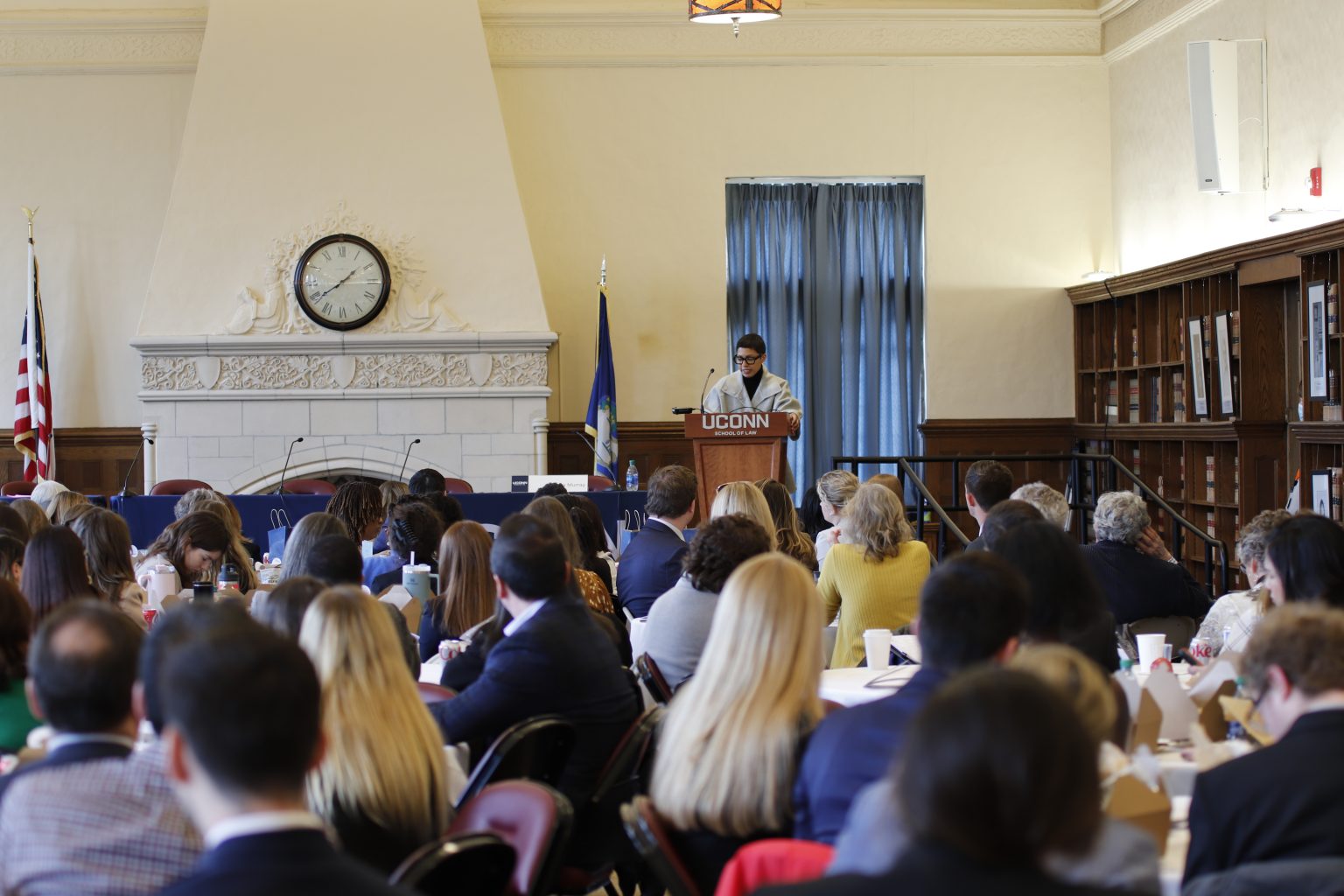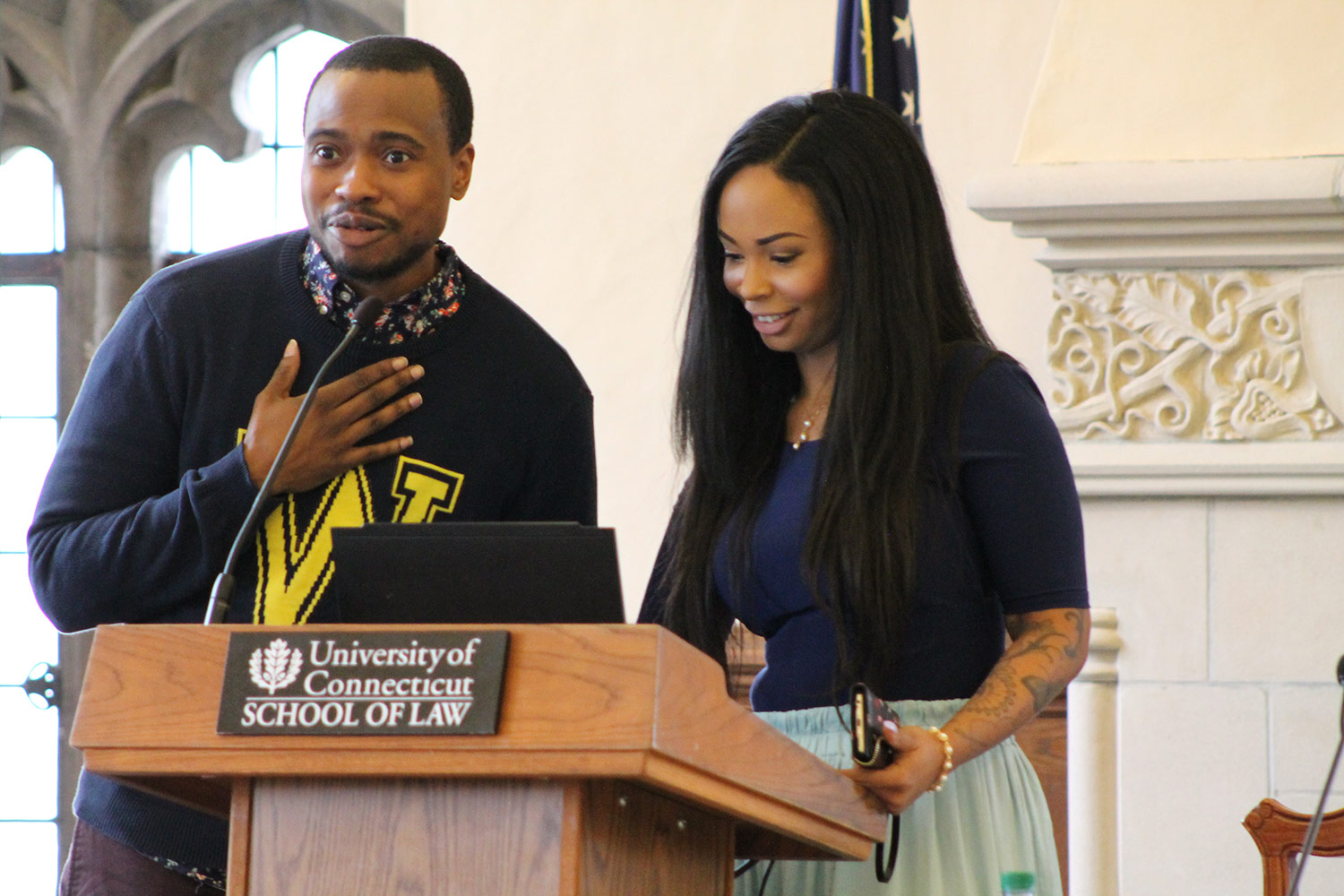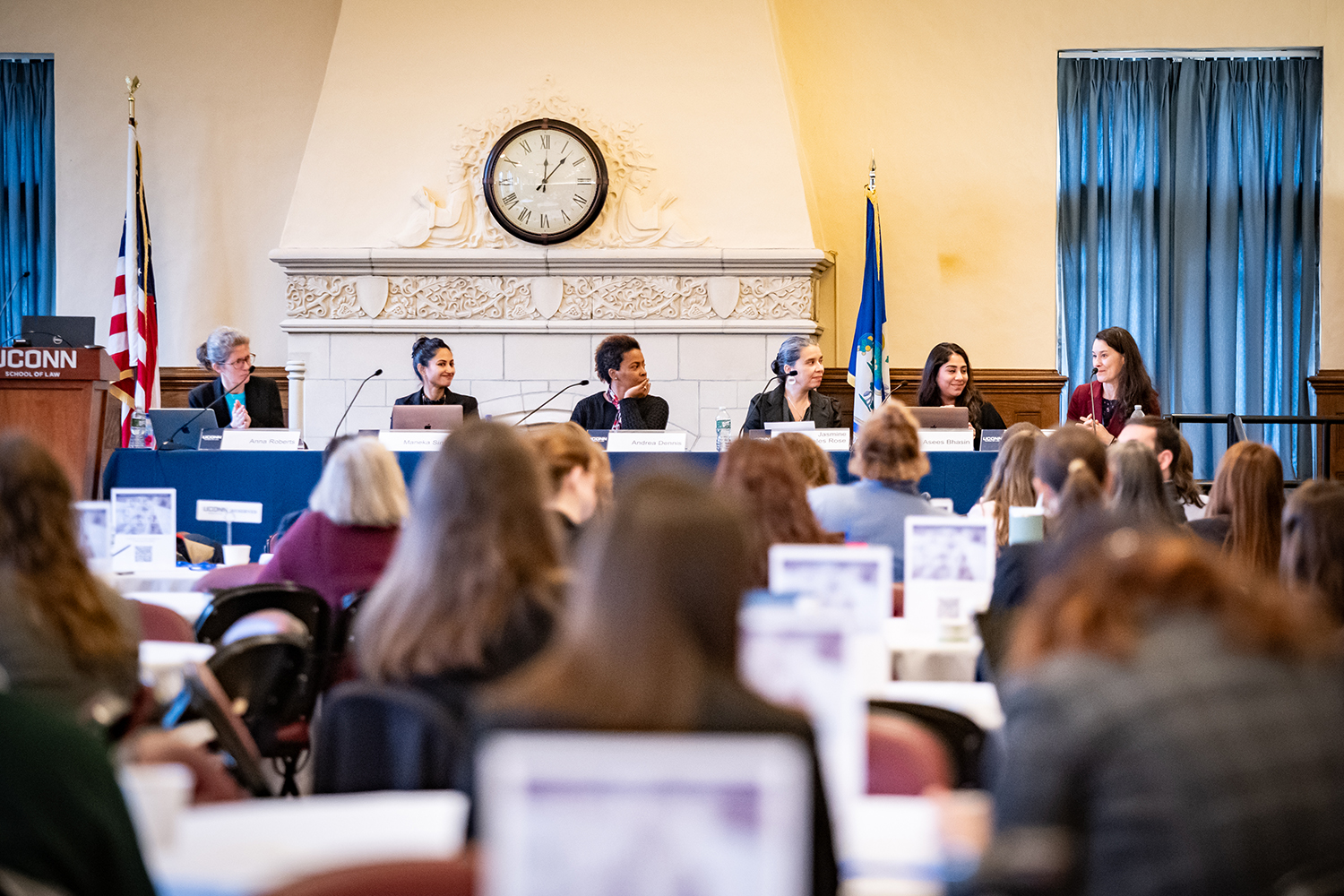2024: Evidence Through a Critical Lens
The Connecticut Public Interest Law Journal's symposium on January 26, 2024, explored how the law of evidence intersects with systems of inequality based on gender, racial, and other marginalized group-based status. It included sessions aimed at problem-solving, both through reform efforts and transformation in pedagogy. The discussion highlighted the possibilities and solutions brought by a critical approach to law, using evidence law as the focus of study. A live recording of the Excited Utterance podcast hosted by Professor Ed Cheng, Hess Chair in Law at Vanderbilt Law School, was included in the program.
>> LEARN MORE

2023: Are Parental Rights Always in the Best Interest of Children?
The Connecticut Public Interest Law Journal's symposium on March 31, 2023, explored parental rights and the parent-child relationship in the different contexts of education, health care, and family. It included moderated debate between legal scholars and practitioners. The discussion highlighted the complexity of the legal issues at the stake and the need for empathy in these conversations. The keynote address was delivered by Professor Melissa Murray of NYU School of Law, who asked the audience to consider what propels judicial recognition of rights, such as parental rights, that are unenumerated yet nonetheless deemed fundamental.
>> LEARN MORE

2022: Prosecutorial Discretion and Mass Incarceration
The Connecticut Public Interest Law Journal held a virtual symposium on February 11, 2022, which focused on how the discretion prosecutors exercise can be a powerful tool for reducing incarceration and the racial disparities that go with it. It included two panels, featured both legal scholars and practitioners. This was followed by a Q&A and moderated discussion, led by Professor Anna VanCleave, about recent data released by the Connecticut Racial Profiling Prohibition Project and the Institute for Municipal and Regional Policy about shifts in crime and their implications.
>> LEARN MORE

2021: Does an Impartial Jury Exist?
On March 26, 2021, the Connecticut Public Interest Law Journal held an online symposium, entitled “Does an Impartial Jury Exist? An Analysis of Implicit Bias in Jury Selection." This symposium had an impressive line-up, as three Connecticut Supreme Court justices and a judge of the Connecticut Appellate Court joined legal scholars and professionals at event. Professor Lauren McLane, director the Defender Aid Clinic at the University of Wyoming College of Law, gave the symposium’s keynote address, challenging white lawyers to confront their own racism and implicit bias. Two panels followed; the first, a panel of three Connecticut Supreme Court justices — Chief Justice Richard Robinson and Justices Raheem Mullins and Maria Kahn — discussed the case law establishing the jury selection processes in Connecticut. The second panel explored the impact of biased juries.

2017: Climate, Carbon & Cars: From Mass v. EPA to Our Electric Future
In collaboration with the Center for Energy and Environmental Law for their 2017 Earth Day Conference, the Connecticut Public Interest Journal hosted a conference titled "Climate, Carbon & Cars: From Mass v. EPA to Our Electric Future." The event, held on April 21, 2017, focused on the present and future of automobiles and their impact on climate change and the environment. The three panels focused on the landmark case, Massachusetts v. EPA; present day automobile emissions and their implications; and the future of automobiles and the social impact of disruptive technologies, such as self-driving cars. The keynote address was given by Dr. Michael Mann, Professor of Atmospheric Science at Penn State.

2016: LGBTQ Youth and the Law
In collaboration with the Connecticut Bar Foundation, the Connecticut Public Interest Journal held a symposium on March 4, 2016, titled "LGBTQ Youth and the Law." This event featured multiple panels discussing LGBTQ youth issues in homelessness, foster care, the juvenile justice system, education, and within their own community. The keynote presentation was given by Kim Katrin Milan, co-founder and executive director of The People Project, and her husband, Tiq Milan, a writer, activist and spokesperson for GLAAD. The pair discussed how the legal community’s focus on such victories as same-sex marriage obscures the challenges that LGBTQ people continue to face on many fronts.

2014: Disparate Impact Theory and Other Forms of Unintentional Discrimination
On October 17, 2014, the Connecticut Public Interest Law Journal held a symposium entitled, “Disparate Impact Theory and Other Forms of Unintentional Discrimination.” The symposium focused on the theory of disparate impact, its practical application and doctrinal viability. The panels discussed, among other things, the practical use and effect of the theory across various industries, such as housing, lending, and employment, as well as how the Supreme Court may be expected to rule on the disparate impact doctrine and what viable alternative, if any, may exist. Panelists included a range of practitioners and academics, including practicing attorneys, professors of law, and economists. The event culminated with a keynote presentation by Amy Wax, Robert Mundheim Professor of Law, at the University of Pennsylvania Law School, and author of Race, Wrongs, and Remedies: Group Justice in the 21st Century (Rowman &Littlefield Publishers, 2008).

2013: The Palliative Use of Marijuana: Demystifying Connecticut’s Policy Concerning Medical Marijuana
On May 31, 2012, Governor Daniel P. Malloy signed of on Public Act 12-55 - Connecticut's medical marijuana law. In response to the legislative process that led to the law's passage, the ensuing regulations, and implementation concerns, the Connecticut Public Interest Law Journal focused their 2013 symposium on Connecticut's new policies concerned the palliative use of marijuana. On October 25, 2013, a variety of lawmakers, policy experts, and legal scholars gathered to discuss the different approaches to this issue, in front of a packed Starr Hall Reading Room. In addition to multiple panel discussions, Commissioner William M. Rubenstein of the Connecticut Department of Consumer Protection gave opening remarks in regards to the new regulatory scheme. The conclusory keynote address was given by Mark A.R. Kleiman, professor of public policy at UCLA, and co-author of Marijuana Legislation: What Everyone Needs to Know.

2012: One Nation Under Law: Exploring How the Law Shapes the Muslim American Experience
The Connecticut Public Interest Law Journal hosted their annual symposium, "One Nation Under Law: Exploring How the Law Shapes the Muslim American Experience," on February 3, 2012. The symposium explored how legal doctrine and social institutions contribute to shaping attitudes toward Muslim Americans and the effect these influences have on the experiences of Muslims in America. Engy Abdelkader, Vice President of KARAMAH, a nonprofit organization committed to promoting human rights globally, gave the keynote address and spoke about the recent movement by many states to outlaw the consideration of Islamic law in courts. In addition to Ms. Abdelkader, this symposium also featured prominent Muslim scholars and legal leaders.

2011: Seeking Justice: The Role of Mental Illness in Defining Guilt
On April 1, 2011, the Connecticut Public Interest Law Journal celebrated their 10th anniversary and hosted a symposium, “Seeking Justice: The Role of Mental Illness in Defining Guilt. Associate Dean Schmeiser provided the attendees with an insightful introduction to the law and policy surrounding criminal justice and mental illness. Professors Anne Dailey and Tim Everett moderated the panels, which were composed of medical and legal academics as well as legal practitioners and others deeply involved with mental health policy issues. The keynote speaker was Mike Lawlor, Under Secretary for Criminal Justice Policy and Planning in the Office of Policy and Management for the State of Connecticut.

2010: Undocumented Immigrants in the Workplace: Exploring Rights and Reforms of America’s Shadow Labor Force
On March 26, 2010, the Connecticut Public Interest Law Journal held their spring symposium, "Undocumented Immigrants in the Workplace: Exploring Rights and Reforms of America's Shadow Labor Force." Professors Michael Fischl and Jon Bauer moderated the two panels: "Rights and Redress for the Undocumented Worker," examining the working conditions and legal issues for undocumented workers under the current system, and "Reforming the Undocumented Workforce," exploring new approaches to regulating immigrant labor and their effects. The keynote address was given by Peter S. Vincent, Principal Legal Advisor for Immigration and Customs Enforcement.

2009: The Road to Prison Reform: Treating the Causes and Conditions of Our Overburdened System
The Connecticut Public Interest Journal held their symposium “The Road to Prison Reform: Treating the Causes and Conditions of our Overburdened System” on February 6, 2009. This event offered three panels focused on a variety of topics including: the legal causes of overcrowding in prisons, the social causes and implications, and prisoners’ rights and system reform. While the legal academics, social scientists and policy advocates who convened all brought different perspectives, all agreed on the severity of the problem in the U.S. prison system. Professor Craig Haney of UC Santa Cruz deviled the keynote address on the conditions faced by today’s prisoners. Haney was a lead research in the infamous Stanford Prison Experiment, which demonstrated the cruelty ordinary people can inflict on others when given the power.

2008: E-Democracy: Democratic Values in a Digital Age
The Connecticut Public Interest Law Journal’s annual symposium was dedicated to an important issue in the 2008 presidential election: the legal and socio-political issues surrounding the intersection of democracy and technology. The symposium, “E-Democracy: Democratic Values in a Digital Age,” was held on February 7, 2008. The three panels, featuring a mix of policy advocates, legal counsel, scholars, and practitioners, covered topics like campaigning on the web, the mechanics of voting, and political speech and the internet. The keynote address, “Government by the People: The Future of XXIst Century Democracy” was given by Beth S. Novak, Professor of Law at New York Law School.

2006: Taxing the Working Poor: Current Policy and Future Changes
The Connecticut Public Interest Law Journal’s fall symposium “Taxing the Working Poor: Current Policy and Future Changes” brought together a distinguished group of legal scholars, taxpayer advocates, social scientists, and representatives from the IRS to discuss complex issues associated with taxing the working poor. The symposium, held on November 14, 2006, featured three panels exploring current tax policy for taxation and tax compliance for the working poor and the future of tax policy in this context. The keynote address, titled “Rethinking Out Understanding of American Poverty,” was delivered by Mark R. Rank, the Herbert S. Hadley Professor of Social Welfare at Washington University in St. Louis.

2005: Who is Being Left Behind? A Look at No Child Left Behind Four Years Later
In partnership with Shipman and Goodwin, LLC, the Connecticut Public Interest Law Journal held their annual symposium on November 15, 2005, titled “Who is Being Left Behind? A Look at No Child Left Behind Four Years Later.” This event focused on the issues surrounding the impact of NCLB requirements on the Connecticut educational system. The two panels - “NCLB’s Effect on School Boards: Staffing Requirements and Costs of Compliance” and “The Impact of NCLB Requirements on Students” - featured a variety of educators, administrators, legal practitioners, and policy advocates. The keynote address was given by Dr. Betty J. Sternberg, Commissioner of Education, Connecticut State Department of Education.

2004: Public Access to Juvenile Court Child Protection Proceedings: Should the Doors be Open or Closed?
The Connecticut Public Interest Law Journal and the Center for Children’s Advocacy together held a symposium “Public Access to Juvenile Court Child Protection Proceedings: Should the Doors be Open or Closed?” The event, held on November 17, 2004, served to question the policy of conducting child protection proceedings in a closed courtroom and discuss its rational and practical effect. The participants included both proponents and opponents of the open court system. The keynote speaker was Minnesota Supreme Court Chief Justice Kathleen A. Blatz, who spearheaded efforts to open child protection proceedings in Minnesota. Presenting the opposing view was William Wesley Patton, Professor of Law at Whittier Law School in California. Other confirmed speakers also include Senator Toni Harp, Judge Michael A. Mack, Elba Montalvo, D.r Ray Sirry and Barbara White Stack.

2003: Megan’s Law: The Impact of Internet Availability of Sex Offender Information
On April 2, 2003, the Connecticut Public Interest Law Journal held a symposium on "Megan's Law: The Impact of Internet Availability of Sex Offender Information." The symposium focused on the legal and social implications of Connecticut's Megan's Law statute, under which the Connecticut Department of Public Safety is mandated to establish, maintain and make public a centralized sex offender registry. The symposium featured two panel discussions. The first, "The Legal Analysis of Megan's Law and Implication of Doe v. Lee in Practice," focused on a recent US.. Supreme Court ruling that resulted in the sex offender registry going back on-line in Connecticut after a two- year hiatus. The second panel explored” Social Implications of Megan's Law for Victims and Offenders.”
